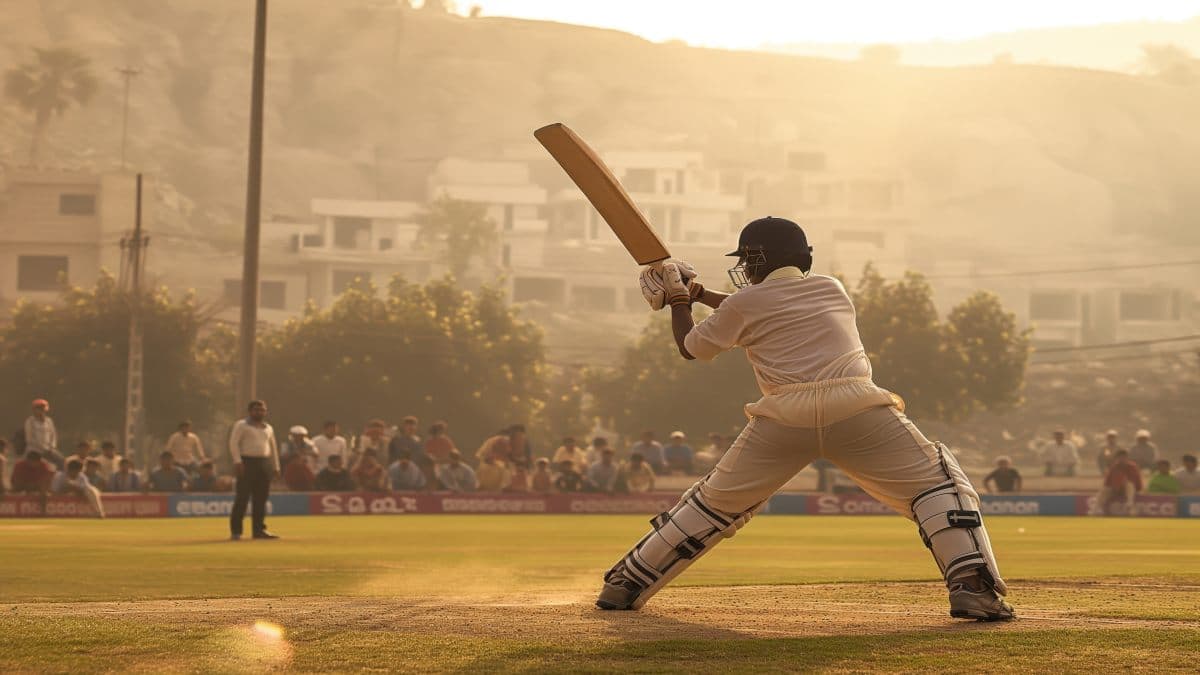What is the Cricket History?: A Kids' Guide to the Exciting World of Cricket
By Pinkey Sharma |
Date 21-08-2024

Table of Contents
Admissions Open for
Ready for an adventure, exploring the excitement of cricket? About cricket, most of you must have watched this game on T.V or played this game in your backyard. Cricket as a sport does hold a lot of history and many interesting rules. So, in this blog, we are going to bring forward what cricket actually is, take a look at the history of cricket, learn how to play cricket, and the different types of cricket. Let's start on this cricket adventure!
What is a Cricket Game?
Before we move on to the history of cricket, let's first understand about cricket and what this game actually is. A cricket game is played by two teams, each with eleven players on the playing ground. The game is played in a very big field and in a special place mostly in the center of the playing field is a place called a `pitch'. Now let me simply explain how the game is played:
1. The Pitch and Wickets:
In the middle is a rectangular area of the field. It is known as a pitch. There are three tall sticks at both of the ends called stumps, with two short sticks across the top of them, lying flat. All together they are a wicket.
2. Batting and Bowling:
The team who chooses “Batting” will bat while the opposite team will field and bowl. The in-play team has to score runs by making the ball hit their bat and simultaneously cover the distance from one corner of the pitch to the opposite, thus scoring runs in the process. The team that is bowling tries to dismiss a batsman by hitting the wickets with the ball or catches the ball in the air after it has been hit but before it touches the earth.
3. Scoring Runs:
A batsman scores runs by hitting the ball and running to the end from which he is playing the shot. These runs can be scored by hitting the ball, which enables a runner to get across the pitch to the other end. A player can score these runs by either hitting the boundary, which scores a four if the ball first bounces on the ground and then crosses the boundary, and six runs are counted if the ball crosses the boundary without touching the ground.
4. Getting Out:
A batsman can be dismissed in a few ways: bowled (the ball hits the wickets), caught (the ball is caught in the air by a fielder), or leg before wicket (LBW)—if the ball has pitched in line and, had it not hit the leg of the batsman first, it would have gone on and hit the wickets.
5. Innings and Overs:
A game of cricket can be divided into innings—a gentle word, as indeed the word 'innings' in itself has the sense that each side has a chance to go in to bat and to bowl. The smaller unit is by overs, when the same bowler delivers every one of six balls.
The Inviting History of Cricket
The history of cricket is pretty interesting, dating back centuries. Let us take a journey through the history of cricket to see how this glorious game has transformed over the years.
Cricket has its history traced back to the 16th century in England. Although cricket at that time was under a disadvantage of not being played in accordance with the modern-day rules, various forms were entertaining children and adults. Here is a look into the past at the early history of the game:
1. The First Histories of Cricket:
The initial history of cricket dates back to the year 1550 in England. That was a rustic game with simple equipment - sticks and a ball. With the years passing by, cricket started receiving some structure and consequently, popularity.
2. Game Transformation in the 17th Century:
Something very interesting about cricket is its transformation. The 17th century was the time when cricket was shaping decisively to become a more formal game. It was in the 17th century that the sport gained extensive popularity that it drew significant attention from nobles and wealthy people who began to form the first- ever formal teams and clubs. The 18th century was significant in the history of cricket in that many of the development or changes in the sport took place within this time.
1. Formation of Cricket Clubs: Formation of Marylebone Cricket Club ( MCC ) in the year 1787 at the grounds of Lord's Cricket, London, was of tremendous importance. The paramount activities performed by MCC were to standardize the rules of cricket and to raise the bars for promotion in cricket.
2. Standardization of rules: When we speak about cricket, the first thing we need to consider are its rules. The MCC wrote the first initial laws of cricket, followed by efforts for the standardization of the game and legitimization of fair play. These rules formed the base from which modern cricket emerged.
3. Popularity of Cricket: In England, at the end of the 18th century, that was the time when the game of cricket developed beyond expectations. Crowded playing matches were experienced, and the game started to move towards other nations.
The Global Spread of Cricket
British explorers and colonists introduced cricket to quite a few countries. Here's how cricket spread to different parts of the world:
1. Cricket in Australia:
Cricket was first introduced in Australia by British settlers early in the 19th century. It was in 1803 that the very first recorded game of cricket that exists today took place in Australia. Gradually, the game found popularity, and Australia went on to carve out a revered history in its cricket exploits.
2. Cricket in India and Pakistan:
British colonialists gave birth to a new game in the 19th century in the cradle of the Indian subcontinent. And in its history, cricket in both India and Pakistan has been seen as a main reason that showers them with strong developed cricketing cultures. Many famous cricketers come from India and Pakistan, and that continues the good cricketing traditions of these nations.
3. Cricket in West Indies
The West Indies imbibed the spirit of cricket as a part of traditional values from the colonial power of Britain in the 19th century, as those were the days of the empire when the game was promoted on the islands. The West Indian cricket team is best known for its flamboyant and aggressive attitude towards the game.
4. Cricket in South Africa
Cricket had been introduced in South Africa since the British White ruler's period. The country followed the game with effective enthusiasm, and there was a development of South Africa as a cricket nation playing domestic and international series continuously.
Modern Day Cricket and Innovations
Cricket has been vibrant and matured in recent years, suiting the feel of modernity. Here is the glimpse of some key developments:
1. Inception of T20 Cricket:
The format of T20 was introduced in 2003 since it came into the playing field and brought about a complete turn of events in the game. The T20 matches remain short, whichever way one may look at it, along with excitement, the average span nearly three hours. For example, the Indian Premier League is one of the renowned Twenty20 leagues that has the presence of the best players around the globe.
2. International Competitions:
ICC Cricket World Cup should be organized at least once in four years where the world's best teams from different nations take part. Cricket World Cup reaches top in the list of the most watched sporting competition across the globe right after the FIFA World Cup.
Simple Rules of Cricket
Now that we have taken in all the vital information regarding the history of cricket, let's know what this game actually is and how to play it. Not having knowledge of the rules, it is hard to enjoy the game or to play amongst friends.
1.Teams and Equipments:
There are eleven players in a team. The basic equipment with which the game is played are bat, ball, wickets, and protective equipment in the form of a helmet, pads, and gloves.
2.The Toss:
Before starting the play, two captains of the teams toss a coin and the winning captain gets to choose whether his side will bat or bowl first.
3.Batting and Bowling:
The batting team sends two players, the batsmen onto a playing field. The bowling team, though represented by one player as the bowler who delivers the ball, has other players spread around the playing field acting as fielders.
4.Scoring Runs:
How a batsman scores one run by hitting the ball and crossing over the wickets. Otherwise, a batsman may also score multiple runs by connecting the ball to the boundary or over the boundary.
5.Getting Out:
A batsman can get out more than a few ways, such as bowled, caught, and LBW. An “out” batsman is replaced by some other player from the same batting side.
6.Overs and Innings:
An over is when a bowler bowls six times. On the sixth delivery, he was changed by another bowler. Turns are provided to every team for their respective innings to bat and bowl.
How to Play Cricket: Step-by-Step Process
1. Setting:
Place the pitch in the center of the field. Set the stumps at the two ends of the pitch.
2. Bowling:
This is sending the ball from one end of the pitch to the batsman situated at the other end of the pitch with the purpose of hitting the stumps or making a wrong play.
3. Batting:
The batsman stands in front of the stump and tries to hit the ball using the bat. When he hits it, he runs to the other end of the pitch to score runs.
4. Fielding:
The work has mainly to do with fielding, that is, preventing the ball from reaching the boundary and thereby getting the batsmen out. The fielders coordinate among themselves in the matter of gathering the ball and making quick throws.
5. Scoring and Winning:
The team which scores more runs gets a win. If both sides score equal runs, then the match ends in a tie or draw according to the format under which it is being played.
Types of Cricket
Cricket is played in various formats, each having its own style of play and rules. Here are the main types of cricket:
1. Test Cricket
Test cricket is the longest format, moving up to five days. To each team, there are two innings of batting and bowling. Test matches are noted for their traditional and strategic play. These are played over a longer duration, allowing more in-depth strategies and skills to be shown.
2. One-Day Internationals (ODIs)
Now, One-Day Internationals are limited only to a duration of 50-over per side. The normal playing duration for these ODISs are 8 hours long. However, ODI is filled with excitement and fast-paced play as teams represent and try to score maximum runs in the limited overs time available to each given team .
3. Twenty20 (T20)
T20 is the shortest format, where each team has 20 overs. In T20 games, the matches are of short duration with thrilling action, normally lasting three hours. It is one of the most popular formats packed with high energy and excitement for cricket.
Conclusion
A long and eventful journey we have come through like what cricket is, the history of cricket, its play, and forms of cricket. From modest beginnings in English fields to a global sport, cricket prides itself—can and does boast of a great history with many compelling elements. Be it batting, bowling, or fielding, it is a team game after all—strategy-based and most importantly, fun. So take a bat, take a ball, and perhaps you will begin your own cricket adventure among a few friends and family members.
FAQ’s
1. What is the history of the game of cricket?
Although cricket's exact origin is unknown, the game may have been played as far back as the 13th century. The first recorded cricket match was played in Kent, England, while the earliest knowledge of cricket playing was documented in 1646, the laws of cricket were created in 1744, and the world's first cricket club was formed in 1760.
2. What is the history of cricket india?
The Indian Cricket team made its Test Cricket debut in the year 1932 and has since moved on to within the top four test teams in the ICC rankings in each of 2005 to 2008. The team has also won the ODI Cricket World Cup in 1983 and 2011.
3. What is the basic explanation for game cricket?
A cricket match is played between two sides or teams with eleven players on each side. The purpose is to defeat the opponent by scoring more runs. The team with more runs at the end of the match wins.
4. What is ABD famous for?
He holds the record for the fastest ODI fifty, which came off 16 balls, the fastest ODI hundred, which came off 31 balls, and the fastest ODI 150, which came off 62 balls. De Villiers has led South Africa in all three formats of the game but gave up the captaincy in Tests due to a spate of injuries.
Take a bat and a ball, and get ready to start your journey of playing cricket today. Kindly share this article with your cricket-loving friends. Enjoy the game!
Other Related Sections
NCERT Solutions | Sample Papers | CBSE SYLLABUS| Calculators | Converters | Stories For Kids | Poems for kids I Practice Worksheets I Formulas
Related Blogs
Introduction to Cricket for Kids : Explore the basics of cricket for kids
Types of Matches in Cricket : Explore How Many Types of Matches in Cricket Exist
Top Indian fielders of all time : Top Indian Fielders of All Time
CBSE Schools In Popular Cities
- CBSE Schools in Bangalore
- CBSE Schools in Mumbai
- CBSE Schools in Pune
- CBSE Schools in Hyderabad
- CBSE Schools in Chennai
- CBSE Schools in Gurgaon
- CBSE Schools in Kolkata
- CBSE Schools in Indore
- CBSE Schools in Sonipat
- CBSE Schools in Delhi
- CBSE Schools in Rohtak
- CBSE Schools in Bhopal
- CBSE Schools in Aurangabad
- CBSE Schools in Jabalpur
- CBSE Schools in Jaipur
- CBSE Schools in Jodhpur
- CBSE Schools in Nagpur
- CBSE Schools in Ahmednagar
- CBSE School In Tumkur

Call Us to know more about Orchids
Swipe Up

















